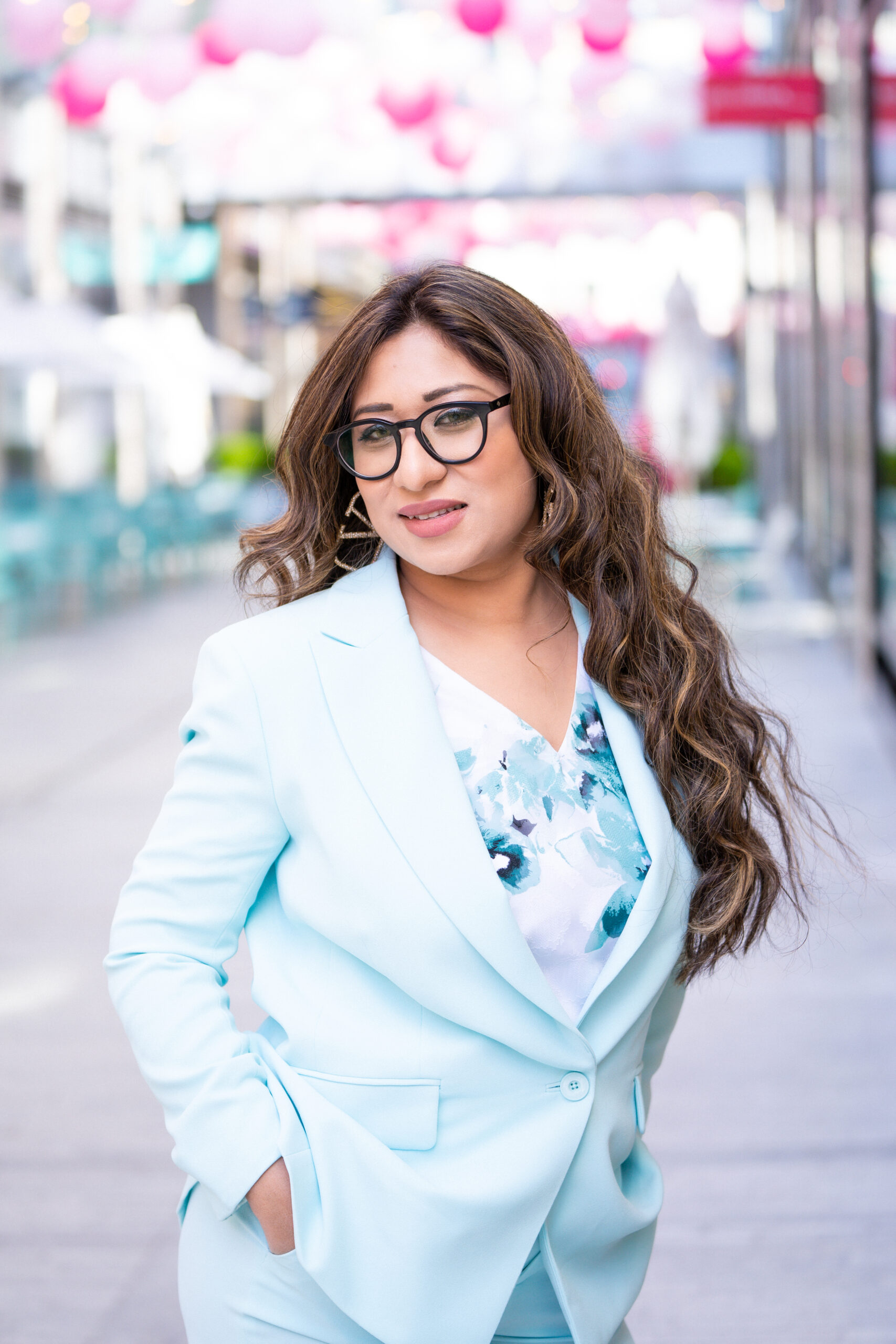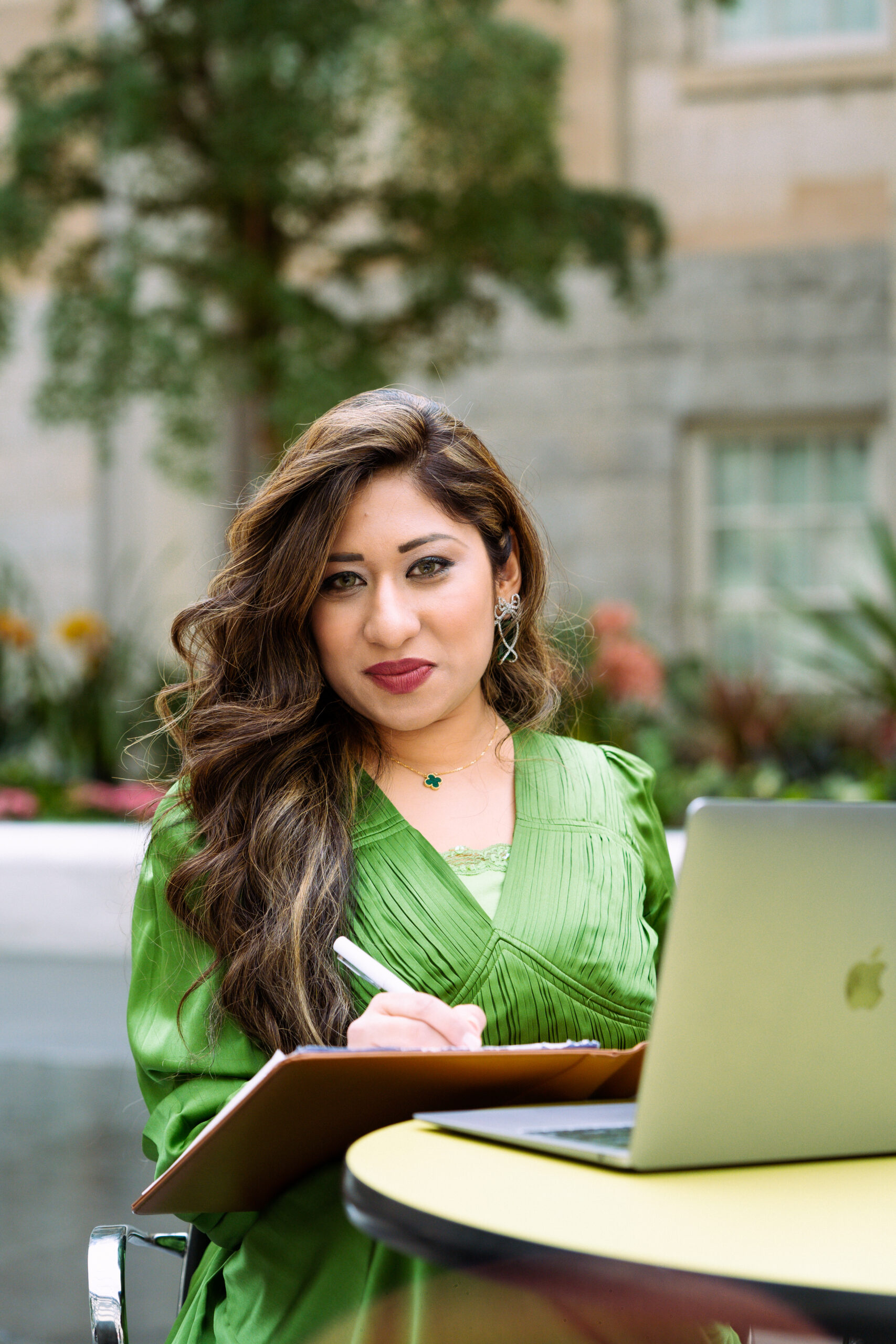
Millionaire Mentor | The Law Office of Mohaimina Haque, PLLC
Meet Attorney Mohaimina Haque, otherwise known as “Mina”. She is the Founder of her own law practice, a mother, professor, general counsel and businesswoman. With years of experience in immigration, business law and personal injury, her firm offers a wide range of expertise focusing on helping both large scale businesses or individuals with their legal issues. Working with some of the biggest brands in North America, Mina knows how to tackle a problem head on, hanging expectations as well as build long lasting relationships with clients all over the globe. She is an advocate for equality, political rights and making a difference in the world.
Tell our readers a bit more about you and your background before you got into law.
I went to high school in Northern Virginia, in Loudoun County. My parents moved a lot growing up. When we finally moved to Loudoun County in Northern Virginia in Leesburg, I was happy to find a place that I could call home. I went to Mount Holyoke College in Massachusetts for a year, and I transferred later to Georgetown University in Washington, DC. I got my undergrad at Georgetown. Subsequently, I got a master’s degree in Georgetown and went to law school at American University.

What brought you to pursue a career in the law?
There are a lot of personal stories intertwined. I got married right after high school at the age of 18. When I started talking to my husband I was really young, but something just felt really right. He was someone I just knew, even at a tender age, would support my educational pursuit. And he has demonstrated that through thick and thin. He is a prodigy. At a very early age, he already had two masters at that time. He was only 23 and I was 18 when we tied the knot.
There were a lot of compromises that we both made for each other. As a result, we were able to fulfill each other’s dreams as well. When he got into Georgetown Law, I transferred to Georgetown. At that time, transferring wasn’t an easy decision, but it was an easy and seamless transition. I just knew that I wanted to be where my husband would be. Ultimately, I am glad we made that decision. He started at Georgetown with the Dean’s scholarship. That was an opportunity I didn’t want him to give up. And while I was studying at Georgetown, I was also an intern in Senator Ted Kennedy’s office. Being in Washington, I wanted to take full advantage of all the possibilities the city offered.
What brought you to pursue a career in the law?
A year later, I found out I was expecting our first child. And I was only 21 years old at that time when I was expecting. My husband was a law student and I was an undergraduate student. Obviously, I thought there was no option, “I’m going to take a break from my semester and I’m just going to keep on going.” And it was possible. It takes a village to raise a family. Part of the reason it was possible was that I had the support of my family as well. My mother was the backbone of my pursuit. Although my story is something where I didn’t have to give up much, part of the reason was I did have a support system. I continued with my classes, I did my internship, and I gave birth at the age of 21. My daughter is now twelve years old. I feel like she has been growing up with us, going through our educational journey.
After I gave birth to my daughter, I finished my Undergrad. My husband graduated from law school, took the Bar, and passed the Bar. He got a job in the US Department of Justice and I went on to do another Master’s degree at Georgetown. While I was a master’s student at Georgetown and a mom — at that time my daughter was a toddler — I got an opportunity to intern at the White House. This was during the Obama administration. It was at the Executive Office of the President in the Domestic Policy Council.. There were only 10 interns selected from the Commonwealth of Virginia and only about 150 nationwide. The White House received about 10,000 to 30,000 applications per semester for very limited spots. It was a very coveted position. Again, a learning opportunity — always guided by the pursuit of learning.
And then I took a semester off to intern in the White House full time in the Domestic Policy Council. I was in the office of Faith-Based and Neighborhood Partnerships. I was working with our community partners and Faith-Based organizations to further the goals of the Obama administration to make sure what resources the executive branch offers and how they can make changes in people’s lives. During my White House internship. I remember we used to have these great opportunities where we could meet the President, the First Lady, the Vice President (who is the President now), the Chief of Staff, and senior staffers of the White House. In one of our Q&A sessions at this meet and greet, among all the hands that went up for questions, my hand went up during a session with First Lady Michelle Obama. I was probably about 22 years old at that time, a graduate student, mom to a little one, and a White House intern full time. I was very passionate about work-life balance.
The Obamas are so inspiring, and having Michelle Obama right in front of me, I asked her, “How did you balance your work and life being an attorney and mother to two kids?” And she had the most inspiring story ever. She said that she had to juggle a lot and make some adjustments after she became a mother. One of the instances that she cited was, she remembered going to an interview and her little one was in the carrier. She went with the baby carrier to the interview and the secretary was looking after the little one while she went through the interview. I thought that was extremely inspiring — all the changes that you make as a mother. And towards the end of it was the best part. She said, “Wow, you have a lot on your plate, please get some rest.” That really stuck with me. Like, “Wow, the First Lady of the United States is telling me to get some rest.” I remember sending a text message to my husband saying, “Hey, the First Lady just told me, ‘Get some rest.'” So that was extremely inspiring.
After my White House internship, I continued my graduate studies at Georgetown and later got a job in the US Department of Justice in the Antitrust Division. I was a full-time student at the time. Again, the decision came. “Okay, full-time job in the US Department of Justice, graduate program, mom to a little one. What should I do?” I decided to take the job. We were thinking about childcare arrangements. By that time my mom had already looked after my daughter for two years so we thought it was a good time for her to start daycare. My daughter started daycare and I started going to work at DOJ, full time, as a paralegal specialist. In the Antitrust Division, I used to assist attorneys and review mergers and acquisitions of big companies in the energy, airline, and agriculture sector.
After two years, I knew my natural progression was leading to law school because I was very much motivated to serve others. At that point, my daughter was four years old. I thought, “Okay, it’s a good time to go to law school.” My husband had been out of law school for a few years and he had a stable job, so I decided to apply for law school. In the first year of law school, the training was so rigorous, but it prepared me so well.
It’s very important to have a good sense of responsibility. In my whole life, I never had the chance to be irresponsible or careless. My adult life was jump-started by getting married early and being a mother. And personally, my experience has given me the best training possible to become a responsible lawyer. My first year and second year of law school went really well. Then at the end of the second year, in summer, I found out I was expecting again. I ended up graduating from law school, cum laude.
I gave birth at the beginning of the spring semester and 10 days after giving birth I was back in my classroom again. I had a C-section and I didn’t even give myself time to recover. But again, this was all possible because I also had the right support network. I had a supportive husband, my mom was there. After graduating from law school I already had a job lined up. I was selected as an Honors attorney to join the US Department of Housing and Urban Development Office of General Counsel. As an entry-level attorney there, I was drafting regulations. During that time, I thought to myself, “I have two kids, my husband is a practicing attorney, and I have acquired all these skills…” I’m very curious so I’m always looking to learn — through my internship, through my degrees. I was thinking, “What is it that really motivates me? How can I bring all these skills and experiences together?”
I wanted to make a difference and I thought the way to do that was to create my own space, to launch my own law firm. In government, I liked the work. I knew I was somehow making a difference, but I still had to go through a lot of bureaucratic hurdles. You don’t get to see the change you’re making immediately. And I knew if I created my own space, I could see change in a much more expedient manner. Firstly, I could bring in my background and experience. Secondly, I would also enjoy the work-life-family balance more.
When did you launch your own law firm?
I launched my firm in 2019. By then, I had a graduate degree, a law degree, my bar license, two daughters, and a job in two federal agencies. These days with technology, it’s easier to launch your own business. Back in the day, people would think about signing a commercial lease and finding a space. That brick-and-mortar space would be costly. Nowadays, with technology, it’s a lot easier.

I left my job in November of 2018. In December of 2018, I decided, “Hey, I want to launch my firm.” After leaving HUD I was still getting a lot of offers from other federal agencies. At one point, almost seven or eight federal agencies wanted to interview me as an attorney. But I thought, “You know what? I want to explore this seriously.” Everyone thought, “What? You want your own business? How would you find clients?” That’s the question everyone asks you. Or, people are thinking, “Are you out of your mind? Do you have the right skills? Did you learn enough to do this?”
I’m a very determined person. And as you can tell, even at my young age, it’s my determination that brought me this far.
It shouldn’t be a makeshift idea. It shouldn’t be an in-between thing. If I want to launch my firm, if I want to go down the path of entrepreneurship, I have to commit myself to it. I need to change my mindset first. That’s the first thing. I need to know what I want and what I like before I can even serve others. If I don’t know that I won’t be a good lawyer anywhere I go.
On January 2nd, I signed up for a virtual space in Washington, DC and then I registered my business. My husband set up my website. When you’re starting out, you want to make sure that overhead cost isn’t too high. Everyone starts with limited resources, and I was at that phase. To all the naysayers who say, “Where will you get your client?” I had a $300 ad budget on Yelp and I put up everything I had done. I knew that I wasn’t just a law graduate or someone who had a few years of experience under the belt. I had more than that if you count my experience before law school. I have been trained by people in Washington, DC who are decision-makers for nationwide and worldwide policies. I’ve been to meetings, hearings and been in closed-door meetings in the most powerful places in the world. I knew how things are run because I learned from the best places. All those internships trained me, and I knew what I needed to do to serve my clients.
And within just a couple of days of launching, the phone started ringing and emails started coming in. There was a lot of interest to retain my legal services. And it was extremely rewarding to see people putting their confidence in me and in my ability. At that point, I was doing immigration law (I’m still doing immigration law) and some litigation work in the DC Superior Court.
What types of services did you first launch when you opened?
My client base started to grow through the internet and through word of mouth. Clients who are satisfied would refer me to someone. My client started to come from everywhere. In 2019 it was just me alone. Six months later, I added a bookkeeper because by that point I just couldn’t do everything by myself. I needed that support. And I started to work with associate attorneys through this platform called LawClerk where you can hire contract attorneys. I worked with contract attorneys who were out of law school for more years than I had been, but they were working under my supervision to support my firm. As the volume of work was increasing, I needed that support.
I was meeting clients in Washington, DC. I was going to court. I won almost all the cases I filed that year. And then in 2020, when COVID hit, I actually had the infrastructure in place to run a virtual law firm. At that time, people were becoming more receptive to Zoom meetings because there was no other option. Court hearings were scheduled online, depositions were online.
When COVID hit, surprisingly enough, the revenue of my firm probably tripled or quadrupled. For immigration and for trademarking you can represent people all over the world. People were reaching out from everywhere. And, again, I had the support of really good law clerks. My affiliate partner, Nelson Happy, is based in New York but he’s also licensed in Washington, DC along with a dozen other states. He has been a lawyer for over 53 years. Having Nelson as my mentor and partnering up with him on major cases was extremely eye-opening. And I still work with Nelson on my major cases.
In the summer of 2021, I was asked by the shareholders of Tony Roma’s to be the outside General Counsel. The work at Tony Roma’s is interesting because they have presence in so many countries. At one time, I’m having a meeting with someone from Chile and at another time, I’m having a meeting with someone from Australia, Bahrain, or Canada. I make sure that the franchise agreements are all in place, checking if anything expired needed to be renewed, that trademark registrations are up to date, checking if anyone owed any delinquent royalty payments.
Tony Roma’s just turned 50 years this year. I never thought being in my 30s I would be running a law firm in the nation’s capital, be outside General Counsel — basically, being the top lawyer in a 50-year-old corporation. Additionally, I also teach law practice management at American University.
What has been one of the biggest challenges for you in starting your own firm?
People always ask, “What is your area of practice?” I don’t do just one. It’s not only immigration, I offer multi-practice areas — just to get that communication out there. But so far, in every practice area that I have offered, I am an expert. I keep my skills and knowledge very sharp. I stay up to date with the trends, with training, I’m part of associations, and work with other lawyers. an attorney in Washington, DC, I have had the good fortune to represent doctors, lawyers, professors, filmmakers, foreign dignitaries, federal agency staff, C-Suite employees, defense contractors — people from all walks of life.
I am a general counsel for a corporation but I also like to work with individuals — people who want to come to the United States, people who want to reunite with their families, or those who are fighting for their rights against a corporation because they have been discriminated against. I can represent anyone I want because of the space I have created. I just don’t want to represent only one group of clients.
Having an attorney who is compassionate and has the knowledge, skills, and experience to help you solve your legal problem — I’m a problem solver. And good lawyers, if they have that skill set, they know how to solve that problem. It requires a lot of training, keeping your knowledge and skills sharp. You need to have very robust research skill, you need to ask the right questions to arrive at the right answers. Those are the skills that are extremely necessary for any lawyer.
How do you manage your time so well to be able to run all these different things that you do?
Firstly, I really like what I do, so that really helps. The way I motivate myself is I get really excited about the next item I’m going to do. Let’s say I have a list of items I’m doing for my law firm. The next item would probably be doing something for Tony Roma’s. Obviously, it’s not always possible to stay enthusiastic and excited, but the best way to get everything done is to make a to-do list and see which are the ones you can finish quickly and that will give you a sense of satisfaction. I check it off, I move on to the next list. I’m a big list maker. I have one on my phone, on my post-its. That really helps me to get everything done. And obviously, a good support system.
What is something that you look forward to building in the near future either in your personal journey or in your professional life?
In the near future, I want my firm to grow in different locations. In terms of my teaching career, I’m an adjunct faculty member so I would like to teach law practice management in other universities as well and speak at conferences, and launch my own academy.

What does success look like for you today?
It’s a product of hard work and determination.
Photo Credit – Nelli Gordon
For more information, visit her website.
Follow @AttorneyMinadc on Instagram.
Get your hands on the latest tips and tricks of what it means to be a #GOSS. In this free e-book you will dive into 11 business traits that will help you grow your business!
11 Ways To #BeGossy E-book
FREE DOWNLOAD
Find out more inspiring stories from women worldwide of all industries. Follow us on Instagram @GossMagazine.
website design Credit
© Goss Club Inc. 2024 | all rights reserved |
Inspiring & empowering women worldwide.
© GOSS CLUB INC. 2024 | all rights reserved
Share to: